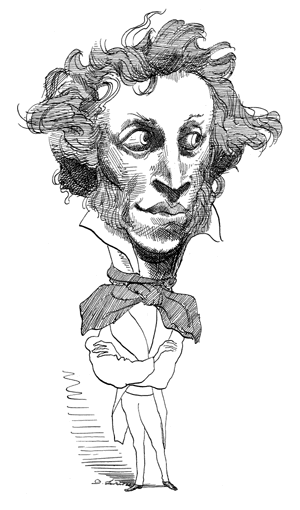In response to:
Will We Ever Pin Down Pushkin? from the March 23, 2017 issue
To the Editors:
In Gary Saul Morson’s amusing article on Pushkin [NYR, March 23] there are a few inaccuracies. When they ridiculed biographical criticism, Russian Formalists did not imagine an article entitled “Did Pushkin Smoke?” as Professor Morson states, but made fun of the old school Pushkinist Nikolai Lerner who published a notorious short piece under this very title in 1913. A line from Eugene Onegin Professor Morson quotes is not “under the sun of my Africa” but “under the sky (pod nebom) of my Africa.” At the end of the article he claims that the Russian phrase “Vasha dama ubita” in Pushkin’s famous “The Queen of Spades” is literally “Your old lady is killed,” but it is not. In the context of the card game, “dama” is the queen and nothing but the queen though in other contexts it certainly can mean “lady” (in fact, of any age). Because of that Richard Pevear and Larissa Volokhonsky’s translation “Your queen loses,” which Professor Morson censures, is absolutely adequate though, of course, it unavoidably lacks the sinister implications of the original. The thing is that in Russian nineteenth-century card parlance “ubit’ (bit’) kartu” meant to eliminate or to trump a card but, literally, “to kill (or beat) it.” Therefore the verb does imply that the protagonist has been guilty of the death of the old countess. The translation “Your queen is dead” might be an option.
Alexander Dolinin
Professor of Russian Literature
University of Wisconsin–Madison
Madison, Wisconsin
Gary Saul Morson replies:
I want to thank Professor Dolinin for appreciating my “amusing” essay, although it is really the quotations from Andrei Sinyavsky’s book on Pushkin, and of course from Pushkin himself, that are amusing. Pushkin is above all an irreverent wit, with a keen sense of the absurd and pretentious, and that sense has always presented a problem for Russians who want to take “the father of Russian literature” altogether seriously. I sometimes imagine Pushkin looking down and making an off-color joke to the ghosts of Voltaire and Chekhov about that sobriquet.
Professor Dolinin, with his eye for detail, noticed what no other reader so far has, that Pushkin’s phrase is indeed “under the sky [not the sun] of my Africa.” Incidentally, the most amusing response to Vladimir Nabokov’s commentary on Eugene Onegin, by the Russian economist and Harvard professor Alexander Gerschenkron, points out that Nabokov’s “sixty-page study of Pushkin’s African ancestor” is “just a gloss, grown out of control, to a single line—‘beneath the sky of my Africa.’” Gerschenkron’s witty piece basically supports Edmund Wilson’s critique, and even points to mistakes in Nabokov’s understanding of Russian, much as Nabokov had mocked Wilson’s. Perhaps that is why Nabokov left that review unanswered.
Gerschenkron stressed Nabokov’s exhibitionist “pedantry”—the novelist goes so far as to criticize Pushkin’s poem for poor scholarship. Gerschenkron observes:
He describes the calendar of the novel year by year, month by month, and day by day, accusing Pushkin—this time more in sorrow than in anger—of having committed mistakes. Tatiana’s Saint’s Day occurred on January 12, 1821, which in that year fell on a Wednesday, but the careless Pushkin unaccountably made it a Saturday (II, 477). Again, Pushkin causes Tatiana, in 1824, to converse with the Spanish ambassador, but Nabokov (with the help of a Russian scholar) found out that in 1824 Spain had no ambassador at the Court of St. Petersburg (III, 183).
This is just the sort of pointless erudition that inspired the Russian Formalists to focus on the article “Did Pushkin Smoke?,” which they imagined (and this is what I meant to say) as representative of all scholarship that misses the forest for the twigs. It is also what inspired Sinyavsky’s delightful Strolls with Pushkin, which captures Pushkin’s playful spirit so often overlooked by scholars as well as by nationalists.
I am puzzled by Professor Dolinin’s objection to my detection of a pun in the phrase Dama vasha ubita. Of course in this context “dama” means “queen” and “ubita” means the queen was beaten. But it remains true that the phrase in a less restricted context literally means “Your lady is killed,” which reminds Hermann just what he has done. It is as if the old lady contrived the double meaning to ensnare her murderer and drive him mad. And it also feels as if Pushkin dreamed up the story when the possible double meaning of the phrase occurred to him. “Your queen loses,” at least without some annotation, gives no hint of what is going on.



